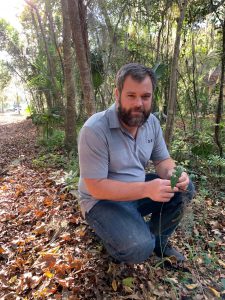Assistant Professor Marcus Lashley is interested in disturbance ecology and how plant community structure influences interactions between competitors and predator-prey dynamics. He received a Bachelor of Science in forestry with wildlife management emphasis from Mississippi State University; a Master of Science in wildlife and fisheries from University of Tennessee; and a doctoral degree in fisheries, wildlife, and conservation biology from North Carolina State University. Lashley joined the Wildlife Ecology and Conservation Department at the University of Florida in Fall 2019.

Here is a Q&A with Lashley about his research, work experiences, and lifestyle outside of the classroom and field.
WORK
What does your current work/research look at?
My current work is broad but focuses on the theme of integrating wildlife ecology, disturbance ecology, and plant ecology. I currently have ongoing projects focused on feral pigs, white-tailed deer, gopher tortoises, wild turkey, and vultures. And those projects are related to fire ecology, carrion ecology, and anthropogenic subsidies and sound pollution.
What classes are you teaching at UF this year?
I am teaching Wildlife Ecology and Management in the fall and will also teach Habitat in the spring.
When did you know you wanted to work in ecology?
I knew that I was to be an ecologist at the age of 5, although I did not at the time know what to call it or that it could be a career. Even so, I have never wavered from this career path at any point since.
What aspect of your work are you the most passionate about?
I am passionate about the idea that wildlife are essential to the way communities assemble and ecosystems function. My work is focused on understanding how conservation efforts can consider the functional roles of wildlife to be successful.
What’s one word that describes how you work?
The one word to describe how I work is “FUN.” Most people who enter this field do so because of fun experiences with nature which fosters passion for natural resources. Thus, I carry the lab motto that “ecology should be fun” and my students and I should choose to work on things that are simultaneously important to conservation and fun.
What’s your favorite organism you’ve studied and why?
It is difficult to pick a single species because I typically focus on communities. However, if I had to choose one, it would be white-tailed deer because it was about this species that I formed my earliest remembered hypothesis. With my graduate students, I designed an experiment and tested that hypothesis during my first year as a faculty member.
What is your favorite place you’ve traveled to as a result of your work?
I traveled to Valles Caldera National Preserve in New Mexico — one of the most memorable trips of my life.
How do you manage your time?
I manage my time by prioritizing family, students, and then tasks in order of importance.
LIFESTYLE
When you were more focused on field research, how did you balance long periods in the field with your personal life?
Balancing time in the field with my personal life was easy for me because I consistently do similar things for fun that I do for work.
What do you enjoy doing in your free time?
I enjoy experiencing nature in my free time, particularly through fishing and hunting.
If you’re a reader, what are you currently reading?
In the last month I have read Nourishment by Fred Provenza, A Sand County Almanac by Aldo Leopold, Selfish Gene by Richard Dawkins, and I am currently reading Guns, Germs, and Steel by Jared Diamond.
CLOSING
Is there one piece of advice they would like to share with students who will read this interview?
Students: Never forget why you got into this field in the first place.
The concept for this interview is based on an interview series by the University of Washington called How UW Works, which is in turn based on a series called How I Work by LifeHacker magazine.
 1
1
